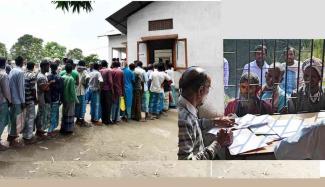The political terrain in Assam and the conditions that led to the drafting of the National Register of Citizens (NRC) have often been euphemistically referred to as ‘complex’, a term that barely captures the anxiety, fear, and sheer inhumanity that has been a part of the exercise. This text attempts to peer into both the ‘political’ background for the demand of the NRC and its implementation in its current form, and the ‘personal’ aspects of the lives of those whom it impacted directly.
The author Abhishek Saha tells us how the NRC process affected him personally, as his grandmother was left out of the citizenship list despite her name being in the NRC conducted in 1951. The question of who really gets to be Axomiya and who gets branded an outsider is determined in a near arbitrary manner with historically transcribed cut-off dates.
While the book deals with a number of issues including the history of the NRC, the procedural defects of the exercise, and the politics behind it, what hits home the hardest are the heart wrenching stories of those who have had to go into detention camps or had to lose everything in order to make a case for themselves at the Kafkaesque Foreigners Tribunal. The NRC exercise shifted the burden of proving citizenship onto people who often did not possess the resources to fight for their cases in courtrooms. Many asked the simple question “why do we have to prove that we are citizens of a land in which we were born?”
Documents that sufficed for the rigorous background check to join the Indian Army are apparently insufficient to prove citizenship as the case of Mohammed Sanaullah demonstrated. The problem with the exercise has been the fact that it is rooted in the cartographic anxieties of the post-colonial state. Land over which people had freely moved about for millenia, was suddenly subject to boundary checks and documentation. The commonly used term ‘infiltrators’, which supposes a planned military exercise, betrays this framing (though it was not well hidden to begin with). People fleeing violence or economic hardship can hardly be considered to be ‘infiltrators’, but they are branded so all the same. Children born to parents who may have been immigrants, have also supposedly participated in the military exercise since their birth!
The author points out that the NRC exercise had received at least some degree of acceptance for a myriad variety of reasons. Many had hoped that such an exercise would finally lift the tag of being ‘infiltrators’ from themselves and allow them to get on with their lives. Others had believed that it would be a panacea to all of Assam’s problems including corruption and unemployment. The NRC exercise had clearly left even those who had wanted the process to be conducted deeply unsatisfied. Those who had championed the process felt that the figure of 19 lakh undocumented immigrants (the number of persons left out of the Assam NRC for want of documents) is ‘too low’. They insist that the ‘infiltrators’ had managed to somehow prove that they were genuine citizens. Those who had hoped that the process would finally put an end to the unfounded allegations of being ‘infiltrators’ now discovered that the poison of communalism had been introduced into an already toxic discourse. The BJP, unable to digest the very simple logic that most of the immigrants are ‘Hindu’, started to campaign for the Citizenship Amendment Bill to incorporate them, but found obstinate opposition within the state.
Saha documents the very arbitrary nature of the way the NRC was conducted. Inclusion of one’s name in the 1951 NRC or subsequent electoral rolls was no guarantee of being accepted as a ‘genuine’ citizen. People whose parents were accepted as Indian citizens have themselves been left out. Any bureaucratic error could be used as an excuse to be branded a foreigner. Even the IT giant Wipro was embroiled in the process of integrating the legacy data to the system.
Achille Mbembe in his essay On the Postcolony used the term ‘necropolitics’ to signify the power of the state to dictate how sections of people must live and how they must die. Stating that “under the conditions of necropower, the lines between resistance and suicide, sacrifice and redemption, martyrdom and freedom are blurred”, Mbembe argues that the state orders the death of its citizens through a variety of ‘methods’. The BJP seemingly finds a playbook here, hoping to kill Indians by any means necessary.










